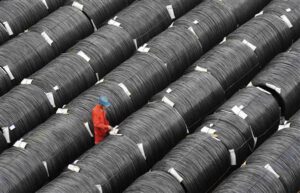The World Trade Organization barredChina on Thursday from imposing duties on certain U.S. steel exports, siding with U.S. President Barack Obama in a dispute with Beijing over a type of steel made in two election battleground states.
 The case involved duties imposed by China on “grain-oriented electrical steel,” which is used in the cores of high-efficiency transformers, electric motors and generators. The steel is made by AK Steel Corp of Ohio and ATI Allegheny Ludlum of Pennsylvania.
The case involved duties imposed by China on “grain-oriented electrical steel,” which is used in the cores of high-efficiency transformers, electric motors and generators. The steel is made by AK Steel Corp of Ohio and ATI Allegheny Ludlum of Pennsylvania.
Although the specialty steel case is tiny compared with other trade disputes with Beijing, the WTO ruling gave Obama a timely win as he defends himself against accusations by his Republican opponent, Mitt Romney, that he is soft on China.
“Today we are again plainly stating that we will continue to take every step necessary to ensure that China plays by the rules and does not unfairly restrict exports of U.S. products,” Obama administration trade representative Ron Kirk said in a statement.
China’s Commerce Ministry said in a statement on its website that it will “handle this case according to WTO regulations”.
But ministry spokesman Shen Danyang criticized “politicization” of trade issues during the U.S. presidential campaign.
“A few American politicians have been gossiping about China-U.S. economic relations. We oppose this kind of politicization of economic and trade relations,” Shen told a news conference, adding that China had “some worries” that campaign rhetoric could affect broader ties.
When the Obama administration filed the case, the volume of specialty steel trade with China was in the range of $250 million. That pales in comparison with the auto and auto-parts trade at issue in the most recent case Washington filed against China in September. The volume of auto parts trade alone amounted to about $12 billion in 2011, according to the Alliance for American Manufacturing.
Derek Scissors, a research fellow at the conservative Heritage Foundation, said Thursday’s ruling was “a small benefit for the Obama campaign because it can advertise ‘beating China’ in Ohio, but it’s not a benchmark for anything.”
Obama has won WTO victories against Beijing in areas ranging from intellectual property rights to financial services to raw materials trade and has launched several other challenges, such as a case against Chinese export restrictions on rare earth materials.
He has also created an interagency trade enforcement unit to devote more resources to ensuring China and other countries abide by global trade rules.
The Romney campaign repeated on Thursday that China was stealing U.S. jobs and that Obama was not standing up to Beijing.
LONG ROAD AHEAD
The United States brought the steel case in September 2010 after China accused U.S. exporters of “dumping” – or selling at unfairly low prices – on the Chinese market and levied punitive duties on the steel imports.
The tariffs, which AK Steel said amounted to about 19.5 percent on its products, potentially affected hundreds of millions of dollars’ worth of the grain-oriented electrical steel.
China imposed the duties after state-owned steel firms Baosteel Group and Wuhan Iron and Steel Group complained about imports from the United States and Russia, which was not a WTO member at the time and was not involved in the case.
The Chinese steel companies were unhappy about the “Buy America” provisions of the American Recovery and Reinvestment Act of 2009 and state government procurement laws.
On Thursday, the WTO appeals judges upheld the original ruling published in June and disagreed with China’s claims that the three-person panel of adjudicators who judged the case then had misinterpreted the WTO rules.
“This is very good news for American producers of this product,” said David Hartquist, a partner with the law firm Kelley Drye who represents ATI.
However, Hartquist said there was still a “long road ahead” as the case had to go through the WTO’s dispute settlement body and China had to comply with the ruling.
Calls to AK Steel’s lawyer were not immediately returned.
The decision of the original panel, which was chaired by New Zealand WTO Ambassador John Adank, received one of the most ringing endorsements by the appellate body in recent years.
(Reuters)













